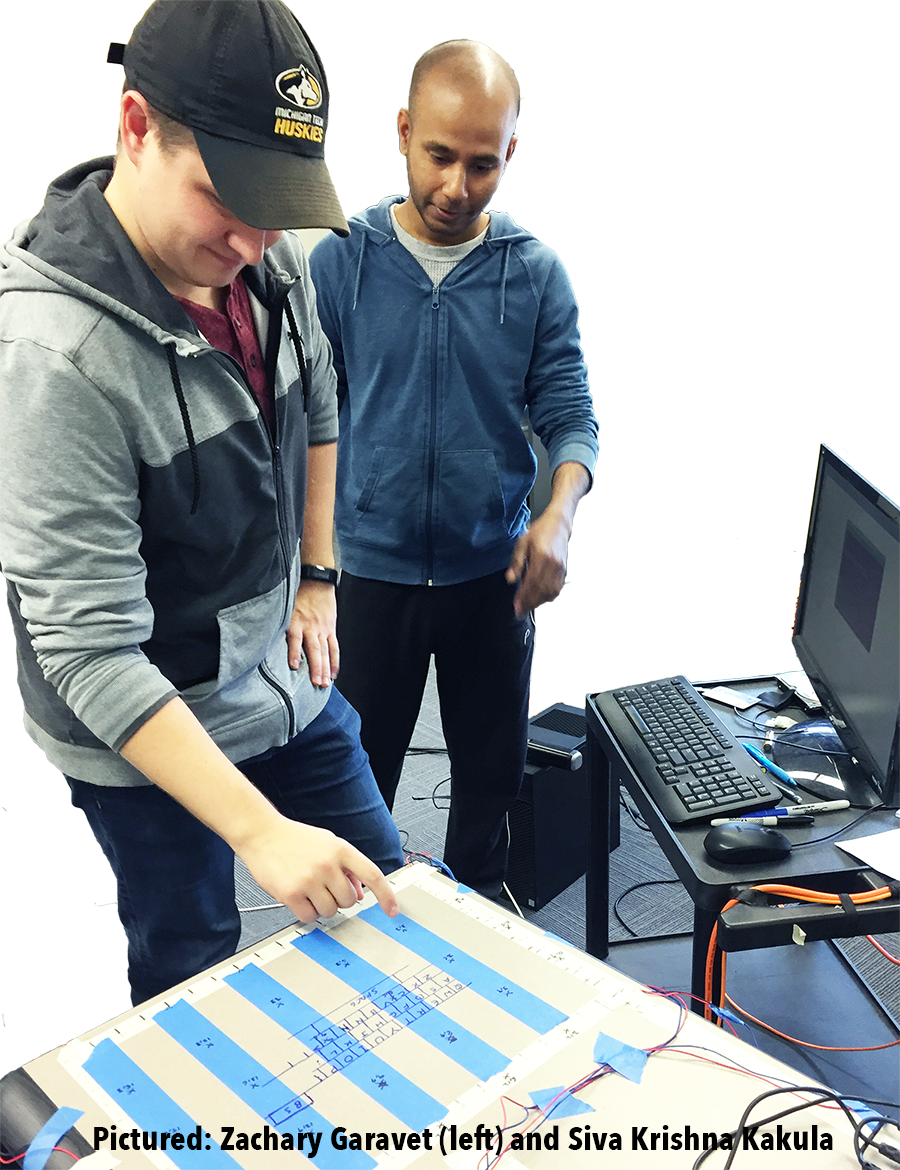
Researchers
Scott Kuhl (Associate Professor, CS)
Keith Vertanen (Assistant Professor, CS)
Amount of Support: $44,000
What if an everyday surface, like a table, could be transformed into a rich, interactive surface that can remotely operate things like computers, entertainment systems, and home appliances?
That’s what Michigan Tech Institute of Computing and Cybersystems (ICC) researchers Keith Vertanen and Scott Kuhl set out to do with a $44K seed grant from Electrical and Computer Engineering alumnus Paul Williams ’61.
Vertanen, assistant professor of computer science, and Kuhl, associate professor of computer science, are members of the ICC’s Center for Human-Centered Computing, which integrates art, people, design, technology, and human experience in the research of multiple areas of human-centered computing. They were assisted in this research by PhD candidate Siva Krishna Kakula, Computer Science, and undergraduate Zachary Garavet, Computer Engineering.
The team’s research goals were threefold: to create machine learning models that can precisely locate a user’s taps on a surface using only an array of inexpensive surface microphones; demonstrate the feasibility and precision of the models by developing a virtual keyboard interface on an ordinary wooden table; and conduct user studies to validate the system’s usability and performance.
The researchers are working on a related technical conference paper to present to their peers. Their outcomes included a prototype virtual keyboard that supports typing at rates comparable to a touchscreen device; possibly the first-ever acoustic sensing algorithm that infers a continuous two-dimensional tap location; and novel statistical models that quickly adapt to individual users and varied input surfaces.
Further, their results, hardware, and data sets can be applied to future collaborative work, and were used in the researchers’ $500K National Science Foundation proposal, “Text Interaction in Virtual and Augmented Environments,” which is under review.
Future applications of the research include enriched interactions in Virtual Reality (VR) and Augmented Reality (AR), compared to existing vision-only based sensing; and on-body interaction, like using your palm as an input surface.
Vertanen and Kuhl plan to continue this research, working to improve the accuracy of tap location inference, build richer interactions like swiping or tapping with multiple fingers, develop wireless sensor pods that can be quickly and easily deployed on any flat surface, and explore the display of virtual visual content on surfaces via Augmented Reality smartglasses.
View a video about this research at https://youtu.be/sF7aeXMfsIQ.
Seed grant donor Paul Williams is also the benefactor of the Paul and Susan Williams Center for Computer Systems Research, located on the fifth floor of the Electrical Energy Resources Center. The 10,000-square-foot, high-performance computing center—the home of the ICC—was established to foster close collaboration among researchers across multiple disciplines at Michigan Tech
The ICC, founded in 2015, promotes collaborative, cross-disciplinary research and learning experiences in the areas of cyber-physical systems, cybersecurity, data sciences, human-centered computing, and scalable architectures and systems. It provides faculty and students the opportunity to work across organizational boundaries to create an environment that mirrors contemporary technological innovation.
Five research centers comprise the ICC. The ICC’s 50 members, who represent 15 academic units at Michigan Tech, are collaborating to conduct impactful research, make valuable contributions in the field of computing, and solve problems of critical national importance.
Visit the ICC website at mtu.edu/icc. Contact the ICC at icc-contact@mtu.edu or 906-487-2518.